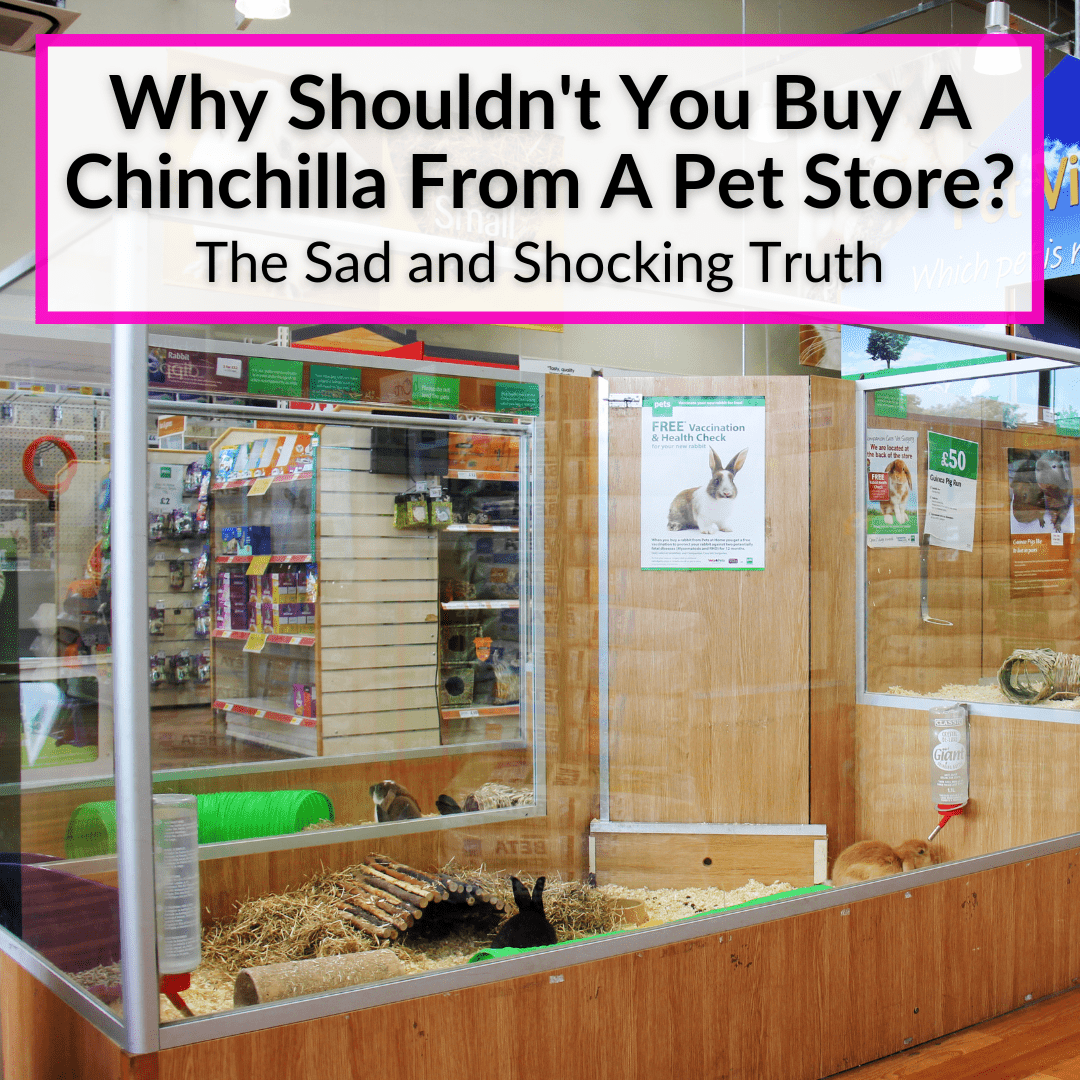
You want to get a pet chinchilla.
Congratulations! They are wonderful pets!
But now comes the next question. Where do you get your chinchilla?
You may have heard pet stores are bad. Why is that?
Why shouldn’t you buy a chinchilla from a pet store?
There are actually three major reasons many caution against buying from pet shops.
Keep reading to learn the sad and shocking truth about pet store chinchillas. We’ll give you the three main reasons to avoid them and some great places to get your chinchilla instead.
Contents
Why Shouldn’t You Buy A Chinchilla From A Pet Store?
You should not buy a chinchilla from a pet store, because pet store chinchillas are often a product of inhumane breeding practices.
Many breeders illegally breed chinchillas and some sellers even poach or trap these endangered animals.
As far as possible, you should only adopt your chinchilla from an animal rescue home or a shelter, so you can give it a second chance at a better life.
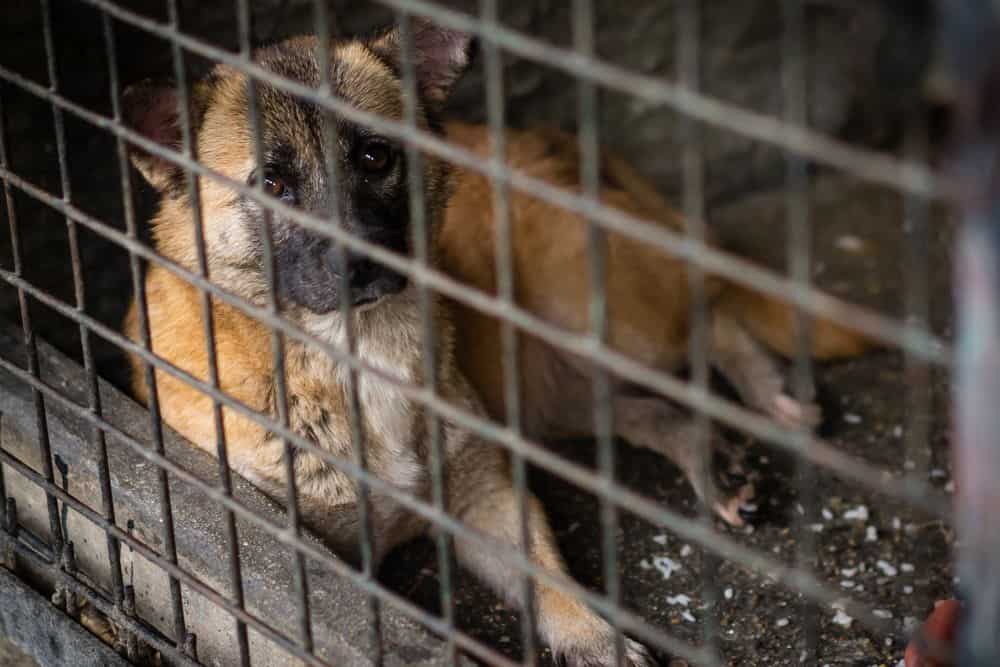
Let’s take a closer look at the main reasons you should not buy your chinchilla from pet shops.
Inhumane Breeding And Possible Health Issues
Chinchilla breeders often indiscriminately breed chinchillas and sell them to pet stores. Many chinchillas bred in captivity are not healthy and are often the product of inhumane and unscientific breeding practices.
Many male and female chinchillas are forced to live in inhumane hoarding facilities to give birth to several kits, which are then sold to pet shops. Often there is inbreeding which can result in various health issues in the kits.
Moreover, these animals are usually forced to live in tiny cages and kept without exercise, healthy food, and water. As a result, many of the animals are sick and often die shortly after the purchase.
Most pet stores don’t care about these things, since they are just after profits (there are some exceptions, of course).
They do not buy their chinchillas from reputed chinchilla breeders. Instead, they buy their animals from illegal chinchilla mills, unscrupulous breeders, and shady trappers, hunters, or poachers.
They do what they can to maximize profits, by purchasing the animals for as low as $50 to $100 per chinchilla. Later, they sell these chinchillas for $500 to $1000 per chin, making huge profits.
While the chinchillas are under their care, they receive minimal food and other care, in order to keep costs low.
Buying from pet stores means that you indirectly support such inhumane breeding chains. To discourage these unscrupulous breeders and pet-store chains, you should refrain from buying from them.
It Is Illegal To Trap Chinchillas In The Wild
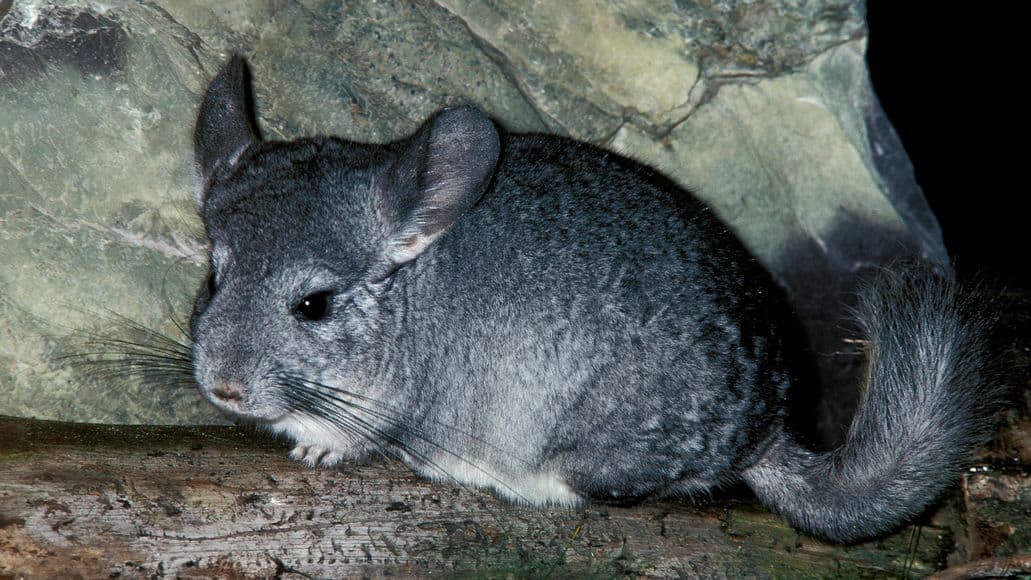
Chinchillas are endangered in the wild. One reason for that is that many chinchillas are trapped and killed for their soft fur.
This is why governments of nations that have chinchilla populations (primarily Chile) have made it illegal to hunt these animals.
Unfortunately, these illegal trappings continue, because the areas where chinchillas are native are harsh and inaccessible, which makes enforcing laws difficult.
Many chins that are brought into the United States are a product of such illegal poaching and trapping practices.
Sure, it is still legal to keep chinchillas as pets in the USA in most states. You can also check out our guide on which states allow pet chinchillas here.
But it is important to deter poachers and hunters who often sell off these beautiful creatures to pet stores. Getting a chinchilla from a reputable breeder does just that.
There Are Many Rescued Chinchillas Awaiting Loving Homes
Finally, the main reason you should not buy your chinchilla from a pet store is that there are many abandoned, abused, and neglected chinchillas that have been rescued and are now living in animal shelters across the United States.
These animals are often rescued from the aforementioned illegal and inhumane chinchilla mills.
Good rescue homes take in such abandoned, sick, and inbred chinchillas and provide them with medical care, shelter, rehabilitation, and healthy food.
The volunteers at these organizations often travel extensively around the country to pick up such poor chinchillas in need.
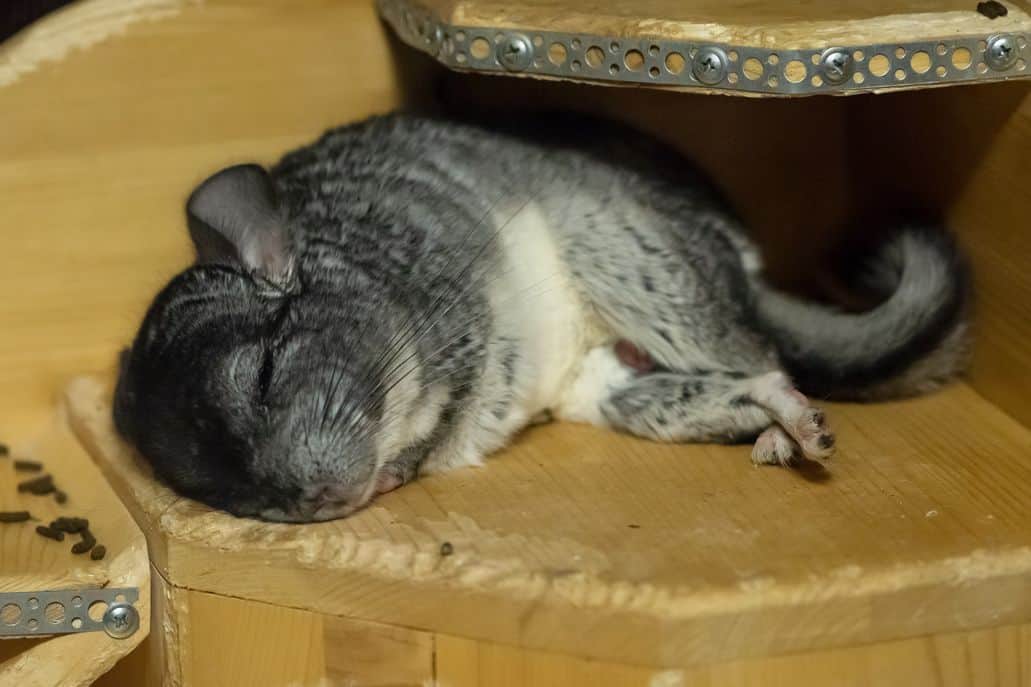
By adopting these rescued animals you can break the chain of illegal and inhumane practices mentioned above. You might even save a chinchilla’s life and provide it with the love and care every animal deserves.
Here are some top rescue organizations from which to adopt a chinchilla:
- Forever Feisty Chinchilla
- Pet finder
- Cuddlebug Chinchilla Rescues
- North East Louisiana Chinchilla Rescue
How Long Do Pet Store Chinchillas Live?
The lifespan of a chinchilla in the wild is 8 to 10 years. In captivity, well-cared-for chinchillas from reputed, caring breeders can live for 15 to 20 years.
It can be hard to say exactly how long pet-store chinchillas live. If the pet shop chinchilla is from a chinchilla mill, chances are it could have a host of health issues.
If a pet store chinchilla has been inbred, it could develop various genetic health issues.
Diseases common in unscientifically-bred chinchillas are bacterial, viral, and parasitic infections, gastrointestinal disorders, reproductive diseases, zoonotic risks, foot diseases, and even cardiac issues.
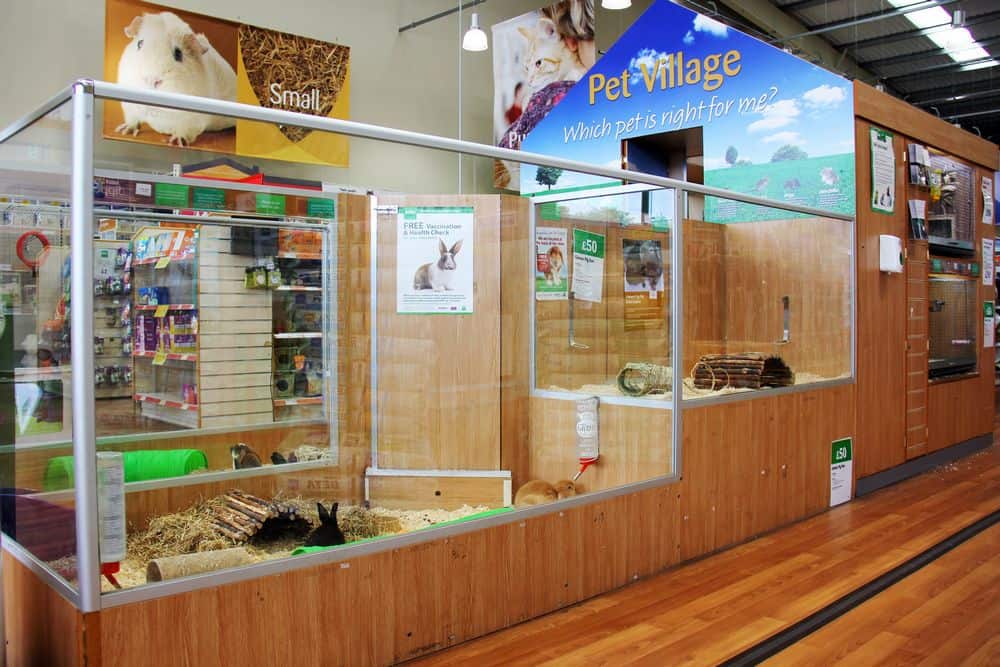
Chinchillas from pet stores often do not receive proper nutrition. This can result in dental issues, since their ever-growing teeth need a constant supply of hay to keep them worn down.
Failure to provide nutritious hay can cause dental abscesses in chinchillas and that can considerably affect their quality of life and shorten their lifespan.
As a result, many pet store chinchillas do not live for more than 4 to 5 years, depending on the medical care and palliative care they receive.
Some have been even known to die within a year, or even just a few months, of being bought home from the store.
Now you might be wondering how to tell how old a chinchilla is, if you get it from a store and they do not know the exact age. There is no good way to tell, though you can make an estimate based on various factors.
Is It OK To Buy A Chinchilla From PetSmart?
Yes, it is better. But still not the best choice. PetSmart and PetCo are not like other regular pet stores. The chinchillas and other animals from these organizations are usually featured animals up for adoption.
These companies have partnered with rescue homes and adoption shelters across the US and they help rehome their rescued animals. Therefore, buying your chinchilla from PetSmart is not too different from adopting.

General pet stores, on the other hand, usually source their animals from unethical breeders and chinchilla mills. As explained above, these animals are forced to live under deplorable conditions.
If you’re truly looking to buy a chinchilla, please do your research. Many top breeders of chinchillas adhere to the code of ethics and breed chinchillas responsibly.
Their animals are also kept in hygienic conditions. They usually have just one litter per year. They also test their breeding stock for health issues and genetic conditions and only breed chinchillas that are healthy.
As stated earlier, adopting a chinchilla from a local animal shelter, or one of the chinchilla rescue organizations listed above, will not only be cheaper but also rewarding.
Some chinchilla rescues even have baby chinchillas. If that is what you want. If you’re looking for a specific type of chinchilla (short-tail, long-tail) or even specific coat colors, you might be able to find one at the above rescue shelters.
Sometimes, you may simply have to wait a bit longer, until the one you specifically want becomes available.
Don’t Buy A Chinchilla From A Pet Store: Final Thoughts
It is best to avoid buying a chinchilla from a pet store. They do not usually source their chinchillas ethically and they tend to not take good care of them. They also do a lot of inbreeding.
On top of that, there are plenty of rescued chinchillas available that need a good home. Why support unscrupulous breeders, when you can instead give a good home to an abandoned chinchilla?
Leave a Reply